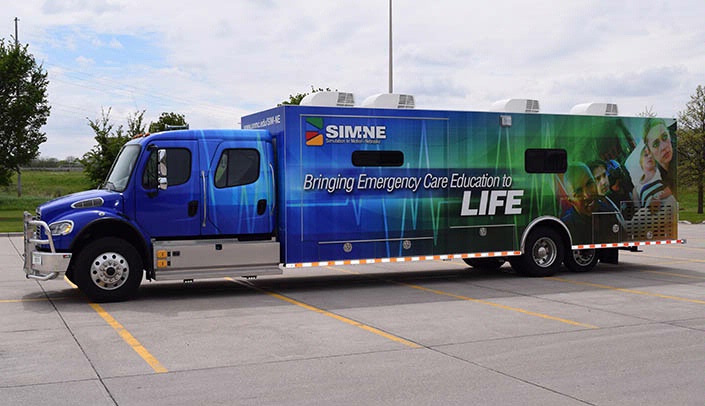The COPIC Medical Foundation of Denver has made a $75,000 gift to the University of Nebraska Foundation to support the Simulation in Motion-Nebraska (SIM-NE) program that was successfully launched this year by UNMC and various partners.
The SIM-NE program brings critical training directly to rural emergency medical service (EMS) providers and health care providers at critical access hospitals in the communities they work. The program makes use of four, 44-foot-long custom simulation vehicles that are outfitted with realistic equipment and high-fidelity patient simulators.
The vehicles can simulate real-life emergency rooms and ambulances and are equipped with mannequins that simulate human patients by speaking, breathing, reacting to treatment and more. They are currently based in Norfolk, Lincoln, Kearney and Scottsbluff and travel the state to provide emergency medical training at no charge.
“Seeing the responses of the EMS providers, nurses, and allied health personnel as they receive training using the latest state-of-the-art equipment to simulate rare but very serious medical conditions is a tremendous reward,” said Brian Monaghan, SIM-NE project director. “The gift from COPIC Medical Foundation helps to ensure we’re able to continue to improve the program and provide training to even more people.”
SIM-NE is made possible through a partnership of educational institutions, academic departments representing a number of disciplines, charitable organizations, and public agencies that are dedicated to improving the health and well-being of Nebraskans. With the equipment, technology and skilled training used by SIM-NE, the university is helping to better prepare medical professionals in rural areas and critical access hospitals.
“It’s very gratifying that the knowledge and skills gained during these training sessions will improve the care of our neighbors and friends who may need assistance in an emergency situation,” said Paul Paulman, M.D., professor of family medicine and the project’s primary investigator. “We’re pleased that COPIC Medical Foundation truly understands the importance of education in saving lives.”
A leadership grant from The Leona M. and Harry B. Helmsley Charitable Trust provided initial resources to the university to start the SIM-NE program and to purchase its first simulation-enabled vehicles while providing a three-year, step-down plan of program support.
Monaghan said continued private support and partnerships, such as that with COPIC Medical Foundation, is critical to keep the program going and to reach the communities where it’s needed most.
